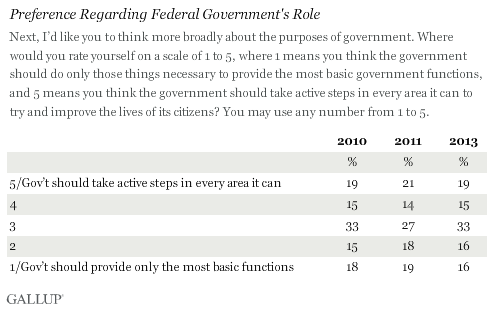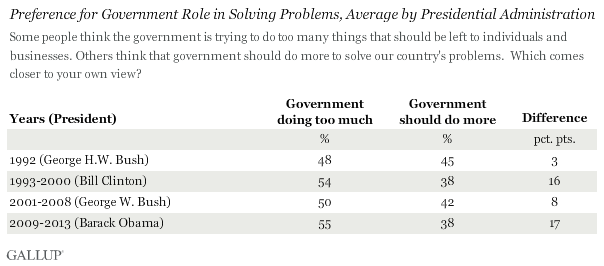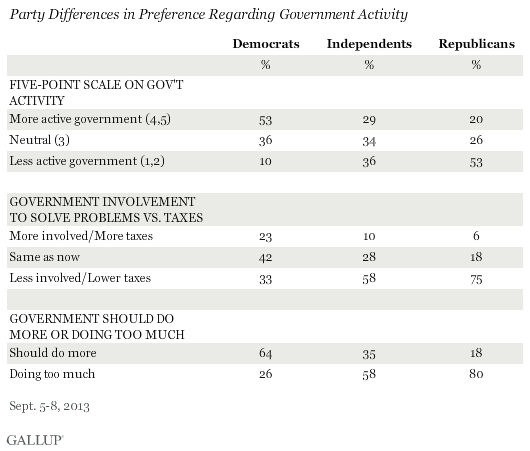PRINCETON, NJ -- Americans continue to be about as likely to favor a more active government as a more limited one when asked about their preferred government role. Specifically, 34% fall on the more active side of a 5-point scale, including 19% who say the government "should take active steps in every area it can to try and improve the lives of its citizens." Thirty-two percent prefer a more limited role, including 16% who say government should provide only the most basic functions. Thirty-three percent place themselves in the middle.

The results are based on Gallup's annual Governance survey, conducted Sept. 5-8, and are generally similar to what Gallup measured on this question in 2010 and 2011. In 2011, however, fewer Americans placed themselves in the middle of the scale and slightly more leaned toward the limited government position.
Although Americans' basic preferences are divided between active and limited government, they tilt more heavily in the direction of limited government in a separate question asking for their preferred tradeoff between taxes and government involvement. A majority, 53%, favor less government involvement in addressing the nation's problems in order to reduce taxes, while 13% favor more government involvement to address the nation's problems, and higher taxes. Another 31% believe government involvement and taxes should be the same as they are now.
The divergence in Americans' responses to the 5-point government-involvement scale and the tax/government-involvement tradeoff question may also be influenced by their perceptions of what government currently is doing. Some segment of Americans may favor an active federal government, but believe the current government goes further than they would ideally like.
There is some support for that hypothesis in another question in the poll, which finds 53% of Americans saying the government is trying to do too many things that should be left to individuals and businesses; 40% say the government should be doing more than it is now.
Gallup has asked that question since 1992. During that time, on average, Americans have been much more likely to choose the "doing too much" option over "should do more" when Democrats Bill Clinton and Barack Obama were president than when Republicans George H.W. Bush and George W. Bush were president. Under all administrations, though, more Americans have said the government is doing too much than have said it should do more.

Democrats, Republicans Follow Predictable Patterns on Role of Government
Generally speaking, Republicans' and Democrats' responses to the questions on government activity are consistent with the parties' philosophies. Whereas 53% of Democrats favor a more active government on the 5-point scale, the same percentage of Republicans favor a less active government.
Independents tilt slightly in the direction of less active government on the 5-point scale, and more heavily toward reduced government activity on whether government should be doing more to solve problems (35%) or is doing too much (58%).
Democrats are not very likely to favor higher taxes to increase government involvement, with only 23% taking this view; but they are far less likely than independents and Republicans to advocate lower taxes and less government involvement. Rather, the plurality of Democrats prefer the status quo.

Implications
Americans couldn't be more divided in their basic preferences for the role of the U.S. government, with roughly one-third favoring an active role for the federal government, one-third favoring a limited role, and one-third something in between. And that has generally been the case for the last few years.
At the same time, Americans seem to favor a less active role for the government than is currently the case, perhaps partly due to a desire for lower taxes but also partly due to perceptions that the current government tends to be more on the active side.
Thus, Americans at this time may be more likely to favor proposed solutions to the major problems facing the country -- including the economy and jobs -- that rely less on government intervention and more on the actions of private entities, including businesses and individuals.
Survey Methods
Results for this Gallup poll are based on telephone interviews conducted Sept. 5-8, 2013, with a random sample of 1,510 adults, aged 18 and older, living in all 50 U.S. states and the District of Columbia.
For results based on the total sample of national adults, one can say with 95% confidence that the margin of sampling error is ±4 percentage points.
Interviews are conducted with respondents on landline telephones and cellular phones, with interviews conducted in Spanish for respondents who are primarily Spanish-speaking. Each sample of national adults includes a minimum quota of 50% cellphone respondents and 50% landline respondents, with additional minimum quotas by region. Landline and cell telephone numbers are selected using random-digit-dial methods. Landline respondents are chosen at random within each household on the basis of which member had the most recent birthday.
Samples are weighted to correct for unequal selection probability, nonresponse, and double coverage of landline and cell users in the two sampling frames. They are also weighted to match the national demographics of gender, age, race, Hispanic ethnicity, education, region, population density, and phone status (cellphone only/landline only/both, and cellphone mostly). Demographic weighting targets are based on the March 2012 Current Population Survey figures for the aged 18 and older U.S. population. Phone status targets are based on the July-December 2011 National Health Interview Survey. Population density targets are based on the 2010 census. All reported margins of sampling error include the computed design effects for weighting.
In addition to sampling error, question wording and practical difficulties in conducting surveys can introduce error or bias into the findings of public opinion polls.
View methodology, full question results, and trend data.
For more details on Gallup's polling methodology, visit www.gallup.com.
